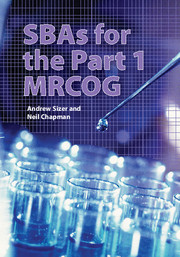Book contents
- Frontmatter
- Contents
- Preface
- About the authors
- Acknowledgements
- Abbreviations
- Foreword
- How to use this book
- 1 Structure and content of the Part 1 MRCOG examination
- 2 Part 1 MRCOG blueprinting matrix, syllabus topics and example questions for paper 1
- 3 Part 1 MRCOG blueprinting matrix, syllabus topics and example questions for paper 2
- 4 Mock paper: paper 1
- 5 Mock paper: paper 2
- Appendix 1 Blueprinting matrix for the Part 1 MRCOG examination
- Appendix 2 Example SBA answer sheet
- Appendix 3 Answers to chapter 2 questions
- Appendix 4 Answers to chapter 3 questions
- Appendix 5 Answers to mock paper 1 (chapter 4)
- Appendix 6 Answers to mock paper 2 (chapter 5)
About the authors
Published online by Cambridge University Press: 05 July 2014
- Frontmatter
- Contents
- Preface
- About the authors
- Acknowledgements
- Abbreviations
- Foreword
- How to use this book
- 1 Structure and content of the Part 1 MRCOG examination
- 2 Part 1 MRCOG blueprinting matrix, syllabus topics and example questions for paper 1
- 3 Part 1 MRCOG blueprinting matrix, syllabus topics and example questions for paper 2
- 4 Mock paper: paper 1
- 5 Mock paper: paper 2
- Appendix 1 Blueprinting matrix for the Part 1 MRCOG examination
- Appendix 2 Example SBA answer sheet
- Appendix 3 Answers to chapter 2 questions
- Appendix 4 Answers to chapter 3 questions
- Appendix 5 Answers to mock paper 1 (chapter 4)
- Appendix 6 Answers to mock paper 2 (chapter 5)
Summary
Andrew Sizer is a Consultant in Obstetrics and Gynaecology at the Shrewsbury and Telford Hospitals NHS Trust. He has a special interest in reproductive medicine and surgery. He is also Senior Lecturer and Undergraduate Lead for Women's Health at the Shropshire Campus of Keele University School of Medicine. Mr Sizer is co-convenor of the RCOG Part 1 MRCOG Revision course and served on the Part 1 MRCOG Sub-committee from 2008 to 2011. He was appointed as a Part 2 MRCOG examiner in 2011. He graduated from the University of Wales College of Medicine in 1994, having completed an intercalated BSc and PhD in Physiology. He then undertook an MD in male infertility and completed his specialist training in 2005. He worked for a year at Kilimanjaro Christian Medical College in Tanzania, from 2001 to 2002.
Neil Chapman is a non-clinical Lecturer in Reproductive Medicine in the Academic Unit of Reproductive and Developmental Medicine at the University of Sheffield. His laboratory research focuses on understanding how the myometrial genome is regulated by NF-κB during pregnancy and labour. The principal funding for this work is currently provided by the Medical Research Council and the Wellcome Trust. He was a member of the Part 1 MRCOG Sub-committee from 2007 to 2011 and was engaged in developing both extended matching questions and, more recently, single best answer questions, which form the basis of the new Part 1 examination.
- Type
- Chapter
- Information
- SBAs for the Part 1 MRCOG , pp. viiPublisher: Cambridge University PressPrint publication year: 2012

